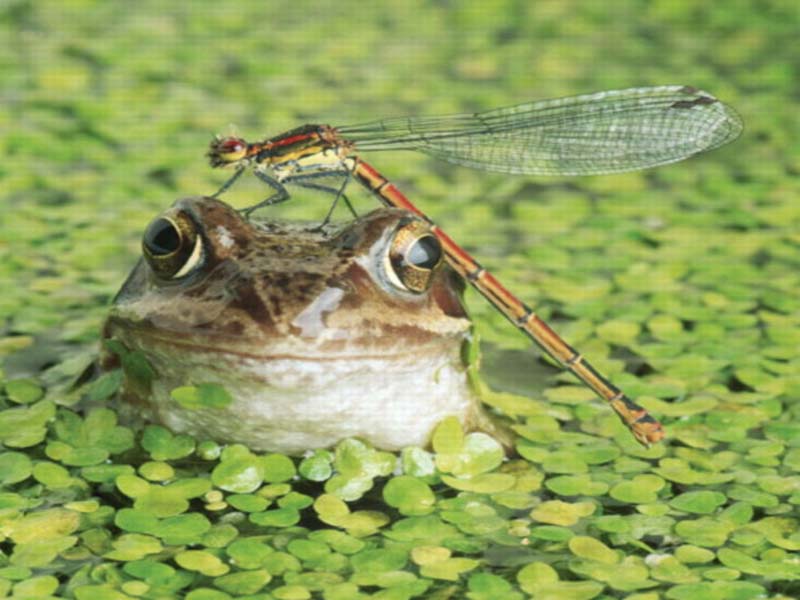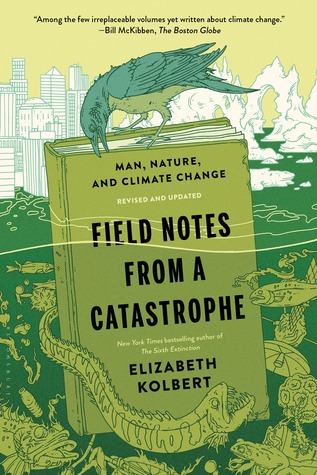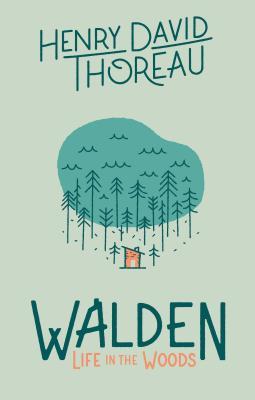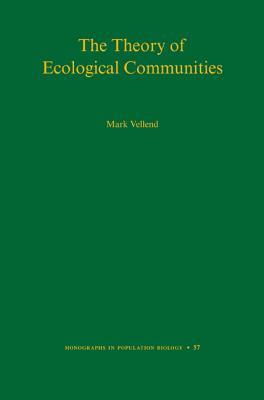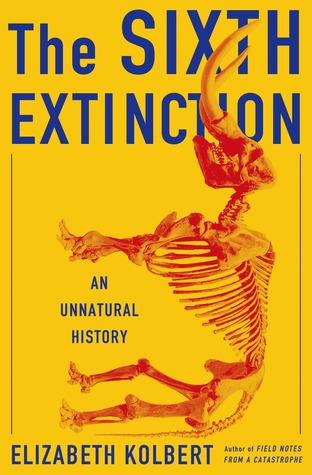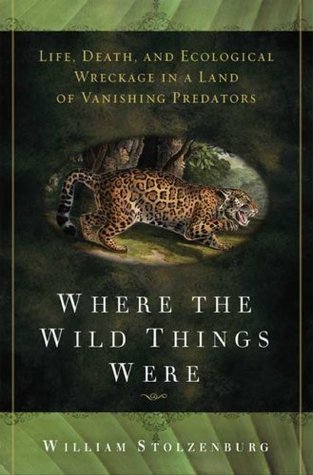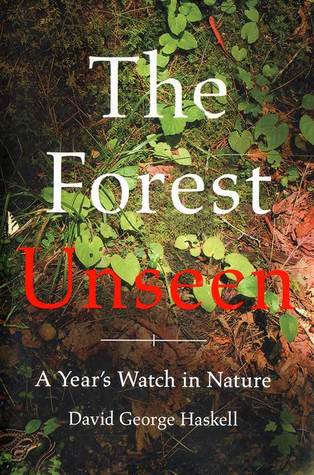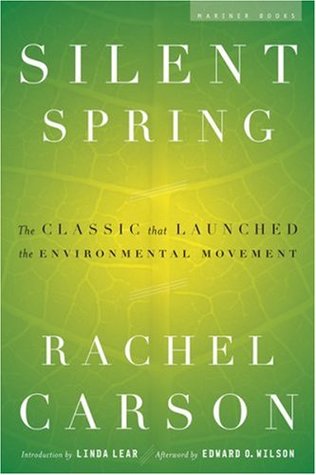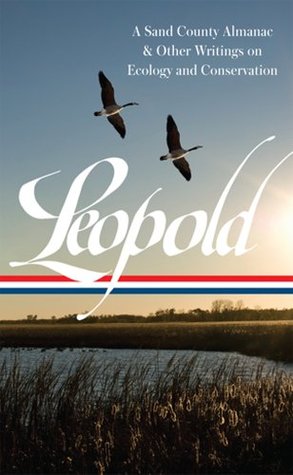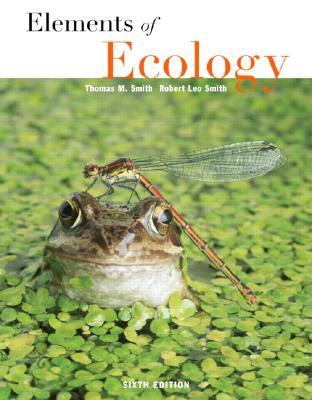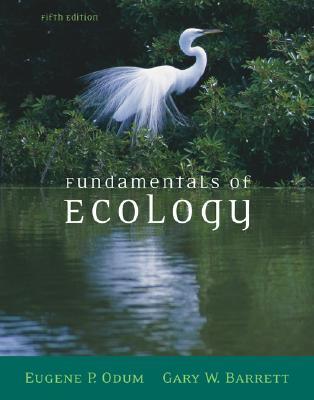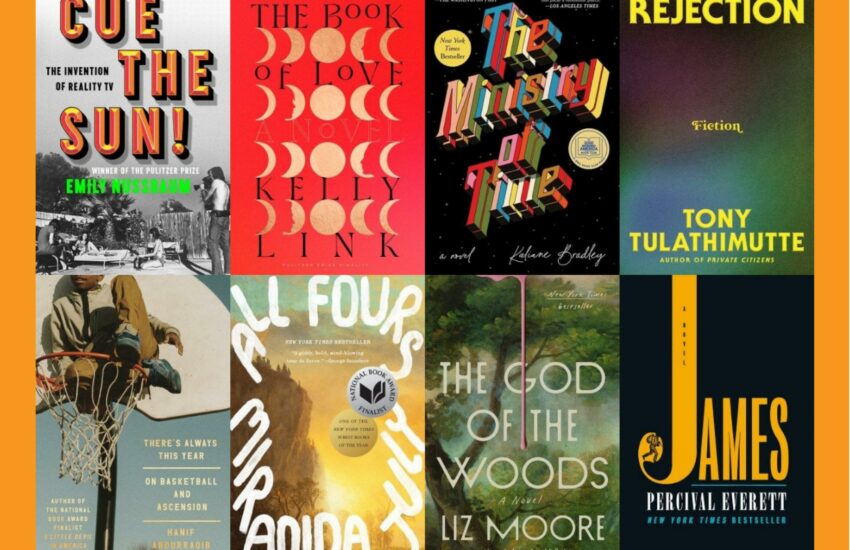The Best Ecology Books Of All-Time
“What are the best books about Ecology?” We looked at 198 of the top books, aggregating and ranking them so we could answer that very question!
The top 10 titles, all appearing on 2 or more “Best Ecology” book lists, are ranked below by how many times they appear. The remaining 150+ books, as well as the lists we used, are in alphabetical order on the bottom of the page.
Happy Scrolling!
Top 10 Best Ecology Books
10 .) Field Notes from a Catastrophe: Man, Nature, and Climate Change by Elizabeth Kolbert
Lists It Appears On:
- Mother Nature Network
- Goodreads
“Elizabeth Kolbert’s environmental classic Field Notes from a Catastrophe first developed out of a groundbreaking, National Magazine Award-winning three-part series in The New Yorker. She expanded it into a still-concise yet richly researched and damning book about climate change: a primer on the greatest challenge facing the world today.
But in the years since, the story has continued to develop; the situation has become more dire, even as our understanding grows. Now, Kolbert returns to the defining book of her career. She’ll add a chapter bringing things up-to-date on the existing text, plus she’ll add three new chapters–on ocean acidification, the tar sands, and a Danish town that’s gone carbon neutral–making it, again, a must-read for our moment.”
9 .) Walden by Henry David Thoreau
Lists It Appears On:
- Goodreads
- Mother Nature Network
In 1845, Henry David Thoreau moved into a cabin by Walden Pond. With the intention of immersing himself in nature and distancing himself from the distractions of social life, Thoreau sustained his retreat for just over two years. More popular than ever, “Walden” is a paean to the virtues of simplicity and self-sufficiency.
8 .) The Theory of Ecology by Mark Vellend
Lists It Appears On:
- Bioteaching
- Dynamic Ecology
“A plethora of different theories, models, and concepts make up the field of community ecology. Amid this vast body of work, is it possible to build one general theory of ecological communities? What other scientific areas might serve as a guiding framework? As it turns out, the core focus of community ecology―understanding patterns of diversity and composition of biological variants across space and time―is shared by evolutionary biology and its very coherent conceptual framework, population genetics theory. The Theory of Ecological Communities takes this as a starting point to pull together community ecology’s various perspectives into a more unified whole.
Mark Vellend builds a theory of ecological communities based on four overarching processes: selection among species, drift, dispersal, and speciation. These are analogues of the four central processes in population genetics theory―selection within species, drift, gene flow, and mutation―and together they subsume almost all of the many dozens of more specific models built to describe the dynamics of communities of interacting species. The result is a theory that allows the effects of many low-level processes, such as competition, facilitation, predation, disturbance, stress, succession, colonization, and local extinction to be understood as the underpinnings of high-level processes with widely applicable consequences for ecological communities.”
7 .) The Sixth Extinction: An Unnatural History by Elizabeth Kolbert
Lists It Appears On:
- Goodreads
- Small Pond Science
Over the last half-billion years, there have been Five mass extinctions, when the diversity of life on earth suddenly and dramatically contracted. Scientists around the world are currently monitoring the sixth extinction, predicted to be the most devastating extinction event since the asteroid impact that wiped out the dinosaurs. This time around, the cataclysm is us. In prose that is at once frank, entertaining, and deeply informed, New Yorker writer Elizabeth Kolbert tells us why and how human beings have altered life on the planet in a way no species has before. Interweaving research in half a dozen disciplines, descriptions of the fascinating species that have already been lost, and the history of extinction as a concept, Kolbert provides a moving and comprehensive account of the disappearances occurring before our very eyes. She shows that the sixth extinction is likely to be mankind’s most lasting legacy, compelling us to rethink the fundamental question of what it means to be human.
6 .) Where the Wild Things Were: Life, Death, and Ecological Wreckage in a Land of Vanishing Predators by William Stolzenburg
Lists It Appears On:
- Small Pond Science
- Goodreads
For years, predators like snow leopards and white-tipped sharks have been disappearing from the top of the food chain, largely as a result of human action. Science journalist Will Stolzenburg reveals why and how their absence upsets the delicate balance of the world’s environment.
5 .) The Forest Unseen: A Year’s Watch in Nature by David George Haskell
Lists It Appears On:
- Small Pond Science
- Goodreads
“In this wholly original book, biologist David Haskell uses a one- square-meter patch of old-growth Tennessee forest as a window onto the entire natural world. Visiting it almost daily for one year to trace nature’s path through the seasons, he brings the forest and its inhabitants to vivid life.
Each of this book’s short chapters begins with a simple observation: a salamander scuttling across the leaf litter; the first blossom of spring wildflowers. From these, Haskell spins a brilliant web of biology and ecology, explaining the science that binds together the tiniest microbes and the largest mammals and describing the ecosystems that have cycled for thousands- sometimes millions-of years. Each visit to the forest presents a nature story in miniature as Haskell elegantly teases out the intricate relationships that order the creatures and plants that call it home.
Written with remarkable grace and empathy, The Forest Unseen is a grand tour of nature in all its profundity. Haskell is a perfect guide into the world that exists beneath our feet and beyond our backyards.”
4 .) Silent Spring by Rachel Carson
Lists It Appears On:
- Goodreads
- Mother Nature Network
Rachel Carson’s Silent Spring was first published in three serialized excerpts in the New Yorker in June of 1962. The book appeared in September of that year and the outcry that followed its publication forced the banning of DDT and spurred revolutionary changes in the laws affecting our air, land, and water. Carson’s passionate concern for the future of our planet reverberated powerfully throughout the world, and her eloquent book was instrumental in launching the environmental movement. It is without question one of the landmark books of the twentieth century.
3 .) A Sand County Almanac by Aldo Leopold
Lists It Appears On:
- Mother Nature Network
- Small Pond Science
- Goodreads
These astonishing portraits of the natural world explore the breathtaking diversity of the unspoiled American landscape—the mountains and the prairies, the deserts and the coastlines. Conjuring up one extraordinary vision after another, Aldo Leopold takes readers with him on the road and through the seasons on a fantastic tour of our priceless natural resources, explaining the destructive effects humankind has had on the land and issuing a bold challenge to protect the world we love.
2 .) Elements of Ecology by Robert L. Smith, Thomas M. Smith, Graham C. Hickman, Susan M. Hickman
Lists It Appears On:
- IASZoology
- Learn 4 Good
- Wiki.ezvid
Elements of Ecology, Ninth Edition continues to explain ecological processes clearly and concisely, with a greater emphasis on the relevance of ecology to everyday life and the human impact on ecosystems. This dramatically revised edition discusses issues of human ecology throughout the text and provides a greater variety of opportunities for students to learn, practice, and develop quantitative and analytical skills. Current research examples and other content updates are supported by more than 200 redesigned, full-color illustrations, graphs, and tables.
1 .) Fundamentals of Ecology by Eugene Odum, Gary W. Barrett
Lists It Appears On:
- IASZoology
- Learn 4 Good
- Wiki.ezvid
The late Eugene Odum was a pioneer in systems ecology and is credited with bringing ecosystems into the mainstream public consciousness as well as into introductory college instruction. FUNDAMENTALS OF ECOLOGY was first published in 1953 and was the vehicle Odum used to educate a wide audience about ecological science. This Fifth Edition of FUNDAMENTALS OF ECOLOGY is co-authored by Odum’s protege Gary Barrett and represents the last academic text Odum produced. The text retains its classic holistic approach to ecosystem science, but incorporates and integrates an evolutionary approach as well. In keeping with a greater temporal/spatial approach to ecology, new chapters in landscape ecology, regional ecology, and global ecology have been added building on the levels-of-organization hierarchy. Also, a final chapter entitled “Statistical Thinking for Students of Ecology” provides a quantitative synthesis to the field of statistics. Contemporary and engaging, this text brings clarity and specificity to the study of ecology in the twenty-first century.
The 150+ Additional Best Ecology Books
| # | Books | Authors | Lists |
| (Titles Appear On 1 List Each) | |||
| 11 | A Biogeoscience Approach to Ecosystems | Edward A. Johnson | Bioteaching |
| 12 | A Critique for Ecology | Dynamic Ecology | |
| 13 | A is for Activist | Innosanto Nagara | Ecology Center |
| 14 | A Language Older Than Words | Derrick Jensen | Goodreads |
| 15 | A remarkable gift to environmental educators | Bora Simmons | Ecoliteracy |
| 16 | A Sting In The Tale | Small Pond Science | |
| 17 | A text book of environmental sciences | Purohit, S.S., Shammi, Q.J. & Agrawal, A.K. | IASZoology |
| 18 | A Walk in the Woods | Bill Bryson | Goodreads |
| 19 | A Whale for the Killing | Mother Nature Network | |
| 20 | Afro-Vegan | Bryant Terry | Ecology Center |
| 21 | Agriculture and Food in Crisis: Conflict, Resistance and Renewal | Brian Tokar | Institute For Social Ecology |
| 22 | Alien Species Intervention | J.K. Accinni | Best Science Fiction Books |
| 23 | Anachism, Marxism, and the Future of the Left: Interviews and Essays, 1993-1998 | Murray Bookchin | Institute For Social Ecology |
| 24 | Animal ecology and distribution of animals | Rastogi, V.B. & Jayaraj, M.S. Animal ecology and distribution of animals. | IASZoology |
| 25 | Animal, Vegetable, Miracle: A Year of Food Life | Barbara Kingsolver | Goodreads |
| 26 | Annals of the Former World | Mother Nature Network | |
| 27 | Art of Fermintation | Sandor Ellix Katz | Ecology Center |
| 28 | Arts for Change: Teaching Outside the Frame | Beverly Naidus | Institute For Social Ecology |
| 29 | Basic ecology | Odum, E.P. | IASZoology |
| 30 | Bay Area Forager | Mia Ander and Kevin Feinstein | Ecology Center |
| 31 | Beak of the Finch | Small Pond Science | |
| 32 | Braiding Sweetgrass | Small Pond Science | |
| 33 | Cadillac Desert | Mother Nature Network | |
| 34 | Changes in the Land: Indians, Colonists, and the Ecology of New England | William Cronon | Goodreads |
| 35 | Concepts of Ecology | Kormondy, E.J. Concepts of Ecology. | IASZoology |
| 36 | Connects all the dots | David Sobel | Ecoliteracy |
| 37 | Cradle to Cradle: Remaking the Way We Make Things | William McDonough | Goodreads |
| 38 | Create an Oasis with Greywater | Art Ludwig | Ecology Center |
| 39 | Deep Economy: The Wealth of Communities and the Durable Future | Bill McKibben | Goodreads |
| 40 | Deschooling Our Lives | Matt Hern | Institute For Social Ecology |
| 41 | Desert Solitaire | Edward Abbey | Goodreads |
| 42 | Dune | Frank Herbert | Goodreads |
| 43 | Eaarth: Making a Life on a Tough New Planet | Bill McKibben | Goodreads |
| 44 | Earth for Sale: Reclaiming Ecology in the Age of Corporate Greenwash | Brian Tokar | Institute For Social Ecology |
| 45 | Earth in the Balance | Mother Nature Network | |
| 46 | Eating the Alphabet | Lois Ehlert | Ecology Center |
| 47 | Ecofascism: Lessons from the German Experience | Janet Biehl | Institute For Social Ecology |
| 48 | Ecological Communities | Donald R. Strong, Jr., Daniel Simberloff, Lawrence G. Abele, & Anne B. Thistle | Princeton University Press |
| 49 | Ecological Diversity and Its Measurement | Anne E. Magurran | Princeton University Press |
| 50 | Ecological Models and Data in R | Benjamin M. Bolker | Princeton University Press |
| 51 | Ecological Stoichiometry | Robert W. Sterner & James J. Elser | Princeton University Press |
| 52 | Ecology (Third Edition) | Wiki.ezvid | |
| 53 | Ecology & Environmental biology | Purohit, S.S. | IASZoology |
| 54 | Ecology and environment | Sharma, P.D. | IASZoology |
| 55 | Ecology and field biology | Smith, R.L. | IASZoology |
| 56 | Ecology in Action | Fred D. Singer | Bioteaching |
| 57 | Ecology of a Cracker Childhood | Small Pond Science | |
| 58 | Ecology of Urban Environments | Kirsten M. Parris | Bioteaching |
| 59 | Ecology, with special reference to animals and man | Kendeigh, S.C. | IASZoology |
| 60 | Ecology: Concepts and Applications, | Wiki.ezvid | |
| 61 | Ecology: Pearson New International | Wiki.ezvid | |
| 62 | Ecology: Principles and applications | Chapman, J.L. & Reiss, M.J. | IASZoology |
| 63 | Ecology: Science and practice | Faurie, Claude et al. | IASZoology |
| 64 | Ecology: The Economy of Nature | Wiki.ezvid | |
| 65 | Ecology: The experimental analysis of distribution and abundance | Krebs, Charles | IASZoology |
| 66 | Ecology: The Experimental Analysis of Distribution and Abundance: Hands-On Field Package | Charles J. Krebs | Learn 4 Good |
| 67 | Ecotopia | Ernest Callenbach | Best Science Fiction Books |
| 68 | Elements of ecology | Klarke, G.L. | IASZoology |
| 69 | Endgame, Vol. 1: The Problem of Civilization | Derrick Jensen | Goodreads |
| 70 | Endgame, Vol. 2: Resistance | Derrick Jensen | Goodreads |
| 71 | Envionmental Science | Wright, R.T. & Nebel, B.J. | IASZoology |
| 72 | Environmental biology and toxicology | Sharma, P.D. | IASZoology |
| 73 | Environmental pollution: causes, effects and control | Purohit, S.S. & Agrawal, A.K. | IASZoology |
| 74 | Environmental science | McKinney, M.L. & Schoch, R.M. | IASZoology |
| 75 | Essentials of Ecology | Jr., G. Tyler Miller | Learn 4 Good |
| 76 | Everywhere All the Time: A New Deschooling Reader | Matt Hern | Institute For Social Ecology |
| 77 | Evolutionary ecology | Pianka, Eric R. | IASZoology |
| 78 | Fallen Angels | Larry Niven, Jerry Pournelle, and Michael Flynn | Best Science Fiction Books |
| 79 | Feral: Rewilding the Land, the Sea and Human Life | George Monbiot | Goodreads |
| 80 | Field and Laboratory Methods | Wiki.ezvid | |
| 81 | Field Day: Getting Out of School | Matt Hern | Institute For Social Ecology |
| 82 | Fine, timely, and needed | The San Francisco Chronicle | Ecoliteracy |
| 83 | Flight Behavior | Barbara Kingsolver | Goodreads |
| 84 | Foraging Theory | David W. Stephens & John R. Krebs | Princeton University Press |
| 85 | Foundations of Ecology: Classic Papers with Commentaries | Dynamic Ecology | |
| 86 | Gaia: A New Look at Life on Earth | James E. Lovelock | Goodreads |
| 87 | Gene Traders: Biotechnology, World Trade, and the Globalization of Hunger | Brian Tokar | Institute For Social Ecology |
| 88 | General Animal ecology | Ananthakrishnan & Viswanathan, T.R. | IASZoology |
| 89 | Geographical Ecology | Robert H. MacArthur | Princeton University Press |
| 90 | Global Ecology in Human Perspective | Southwick, Charles H. | IASZoology |
| 91 | Global environmental issues: A climatological approach | Kemp, David D. | IASZoology |
| 92 | Golden Gate Gardening | Pam Peirce | Ecology Center |
| 93 | Guns, Germs, and Steel: The Fates of Human Societies | Jared Diamond | Goodreads |
| 94 | Important | Frances Moore Lappé | Ecoliteracy |
| 95 | In Defense of Food: An Eater’s Manifesto | Michael Pollan | Goodreads |
| 96 | Infochemicals: Invisible bonds binding creatures great and small | Yuvaraj Ranganathan | Bioteaching |
| 97 | Inspired, substantive, and visionary | Booklist | Ecoliteracy |
| 98 | Ishmael: An Adventure of the Mind and Spirit | Daniel Quinn | Goodreads |
| 99 | Lab Girl | Small Pond Science | |
| 100 | Last Chance to See | Douglas Adams | Goodreads |
| 101 | Learning Our Way Out: Adult Education at a Crossroads | Matthias Finger | Institute For Social Ecology |
| 102 | Living in the environment—Principles, connections and solutions | Miller, G. Tyler | IASZoology |
| 103 | Log of the Sea of Cortez | Small Pond Science | |
| 104 | Merchants of Doubt | Mother Nature Network | |
| 105 | Messages from Islands: A Global Biodiversity Tour | Ilkka Hanski | Bioteaching |
| 106 | Method in Ecology | Dynamic Ecology | |
| 107 | Modeling Nature | Dynamic Ecology | |
| 108 | Mollie Katzen’s Recipes: Soups | Mollie Katzen | Ecology Center |
| 109 | Mycelium Running: How Mushrooms Can Help Save the World | Paul Stamets | Goodreads |
| 110 | Natural Capitalism | Paul Hawken | Goodreads |
| 111 | Nature’s Confession | J.L. Morin | Best Science Fiction Books |
| 112 | Neptune’s Revenge | Mother Nature Network | |
| 113 | Never Cry Wolf | Mother Nature Network | |
| 114 | Never Out of Season | Small Pond Science | |
| 115 | On the Origin of Species | Dynamic Ecology | |
| 116 | One Size Does Not Fit All | Beverly Naidus | Institute For Social Ecology |
| 117 | Our Synthetic Environment | Murray Bookchin | Institute For Social Ecology |
| 118 | Pilgrim at Tinker Creek | Annie Dillard | Goodreads |
| 119 | Plant Ecology in the Middle East | Ahmad Hegazy | Bioteaching |
| 120 | Post-Scarcity Anarchism | Murray Bookchin | Institute For Social Ecology |
| 121 | Principles of environmental science, inquiry and applications | Cunningham, W.P. & Cunningham, M.A. | IASZoology |
| 122 | Quantitative Ecology and Evolutionary Biology: Integrating models with data (Oxford Series in Ecology and Evolution) | Otso Ovaskainen | Bioteaching |
| 123 | Ravens in Winter | Small Pond Science | |
| 124 | Re-Enchanting Humanity: A Defense of the Human Spirit Against Anti-humanism, Misanthropy, Mysticism, and Primitivism | Murray Bookchin | Institute For Social Ecology |
| 125 | Redesigning Life? The Worldwide Challenge to Genetic Engineering | Brian Tokar | Institute For Social Ecology |
| 126 | Resource Competition and Community Structure | David Tilman | Princeton University Press |
| 127 | Rethinking Ecofeminist Politics | Janet Biehl | Institute For Social Ecology |
| 128 | Science in the Capital | Kim Stanley Robinson | Best Science Fiction Books |
| 129 | Seamlessly and elegantly communicated | NAAEE Communicator | Ecoliteracy |
| 130 | Secret Life of Dust | Mother Nature Network | |
| 131 | Serendipity | Estes | Small Pond Science |
| 132 | Ship Breaker | Paolo Bacigalupi | Best Science Fiction Books |
| 133 | Social Anarchism or Lifestyle Anarchism: An Unbridgeable Chasm | Murray Bookchin | Institute For Social Ecology |
| 134 | Social Ecology and Communalism | Murray Bookchin | Institute For Social Ecology |
| 135 | Spatial Ecology | David Tilman & Peter Kareiva | Princeton University Press |
| 136 | Stability and Complexity in Model Ecosystems | Robert M. May | Princeton University Press |
| 137 | Start with Soil: The Organic Gardener’s Guide to Improving Soil for Higher Yields, More Beautiful Flowers, | Grace Gershuny | Institute For Social Ecology |
| 138 | The Background of Ecology | Dynamic Ecology | |
| 139 | The best book of its kind | Michael Pollan | Ecoliteracy |
| 140 | The Biology of Deserts (Biology of Habitats Series) | David Ward | Bioteaching |
| 141 | The Botany of Desire: A Plant’s-Eye View of the World | Michael Pollan | Goodreads |
| 142 | The Color of Distance | Amy Thomson | Best Science Fiction Books |
| 143 | The Coming of the Global Superstorm | Art Bell and Whitley Strieber | Best Science Fiction Books |
| 144 | The Diversity of Life | Edward O. Wilson | Goodreads |
| 145 | The Earth Brokers: Power, Politics and World Development | Matthias Finger | Institute For Social Ecology |
| 146 | The Ecological Detective | Ray Hilborn & Marc Mangel | Princeton University Press |
| 147 | The Ecological Rift | John Bellamy Foster | Goodreads |
| 148 | The Ecology of Everyday Life | Chaia Heller | Institute For Social Ecology |
| 149 | The Ecology of Freedom | Murray Bookchin | Institute For Social Ecology |
| 150 | The Empty Ocean | Mother Nature Network | |
| 151 | The End of Nature | Bill McKibben | Goodreads |
| 152 | The Future Of Life | Edward O. Wilson | Goodreads |
| 153 | The Green Alternative: Creating an Ecological Future | Brian Tokar | Institute For Social Ecology |
| 154 | The Hidden Life of Trees: What They Feel, How They Communicate – Discoveries from a Secret World | Peter Wohlleben | Goodreads |
| 155 | The Idea of Biodiversity | Dynamic Ecology | |
| 156 | The Invention of Nature: Alexander von Humboldt’s New World | Andrea Wulf | Goodreads |
| 157 | The Limits of the City | Murray Bookchin | Institute For Social Ecology |
| 158 | The Limits to Growth: The 30-Year Update | Donella H. Meadows | Goodreads |
| 159 | The Lorax | Dr. Seuss | Goodreads |
| 160 | The Modern Crisis | Murray Bookchin | Institute For Social Ecology |
| 161 | The Monkey Wrench Gang | Edward Abbey | Goodreads |
| 162 | The Murray Bookchin Reader | Murray Bookchin | Institute For Social Ecology |
| 163 | The Omnivore’s Dilemma: A Natural History of Four Meals | Michael Pollan | Goodreads |
| 164 | The One-Straw Revolution | Masanobu Fukuoka | Goodreads |
| 165 | The Origin of Species | Charles Darwin | Goodreads |
| 166 | The Philosophy of Social Ecology: Essays on Dialectical Naturalism | Murray Bookchin | Institute For Social Ecology |
| 167 | The Politics of Social Ecology | Janet Biehl | Institute For Social Ecology |
| 168 | The Rise of Urbanization and the Decline of Citizenship | Murray Bookchin | Institute For Social Ecology |
| 169 | The Science of Ecology | Richard Brewer | Learn 4 Good |
| 170 | The Sea Around Us | Rachel Carson | Goodreads |
| 171 | The Serengeti Rules | Small Pond Science | |
| 172 | The Song Of The Dodo: Island Biogeography In An Age Of Extinctions | David Quammen | Goodreads |
| 173 | The Soul of Soil | Grace Gershuny | Institute For Social Ecology |
| 174 | The Spanish Anarchists: The Heroic Years | Murray Bookchin | Institute For Social Ecology |
| 175 | The Spell of the Sensuous: Perception and Language in a More-Than-Human World | David Abram | Goodreads |
| 176 | The Theory of Island Biogeography | Robert H. MacArthur & Edward O. Wilson | Princeton University Press |
| 177 | The Theory of Sex Allocation | Eric L. Charnov | Princeton University Press |
| 178 | The Third Revolution Vol. 1-4 | Murray Bookchin | Institute For Social Ecology |
| 179 | The Unified Neutral Theory of Biodiversity and Biogeography | Stephen P. Hubbell | Princeton University Press |
| 180 | The Unsettling of America: Culture and Agriculture | Wendell Berry | Goodreads |
| 181 | The Water-Wise Home | Laura Allen | Ecology Center |
| 182 | The Web of Life: A New Scientific Understanding of Living Systems | Fritjof Capra | Goodreads |
| 183 | The Wild Life of Our Bodies | Small Pond Science | |
| 184 | The World Without Us | Alan Weisman | Goodreads |
| 185 | The Year of the Flood | Margaret Atwood | Best Science Fiction Books |
| 186 | Theory-Based Ecology: A Darwinian approach | Liz Pasztor | Bioteaching |
| 187 | This Changes Everything: Capitalism vs. The Climate | Naomi Klein | Goodreads |
| 188 | To Remember Spain: The Anarchist and Syndicalist Revolution of 1936 | Murray Bookchin | Institute For Social Ecology |
| 189 | Toward an Ecological Society | Murray Bookchin | Institute For Social Ecology |
| 190 | Toward Climate Justice: Perspectives on the Climate Crisis and Social Change | Brian Tokar | Institute For Social Ecology |
| 191 | Under the Sea Wind | Rachel Carson | Goodreads |
| 192 | Urban Homesteading | Rachel Kaplan | Ecology Center |
| 193 | Vegetable Gardener’s Guide to Permaculture | Christopher Shein | Ecology Center |
| 194 | Watch Yourself: Why Safer Isn’t Always Better | Matt Hern | Institute For Social Ecology |
| 195 | Watermind | M.M. Buckner | Best Science Fiction Books |
| 196 | What Kind of Name is That | Beverly Naidus | Institute For Social Ecology |
| 197 | Winter World: The Ingenuity of Animal Survival | Bernd Heinrich | Goodreads |
| 198 | Worms Eat My Garbage | Mary Appelhof | Ecology Center |
13 Best Ecology Book Sources/Lists
| Source | Article |
| Best Science Fiction Books | Ecological Science Fiction |
| Bioteaching | Top 2016 Ecology Books |
| Dynamic Ecology | Books that all ecology grad students should read |
| Ecoliteracy | ECOLOGICAL LITERACY: EDUCATING OUR CHILDREN FOR A SUSTAINABLE WORLD |
| Ecology Center | BEST SELLING BOOKS |
| Goodreads | Popular Ecology Books |
| IASZoology | Books on Ecology & Environmental Science |
| Institute For Social Ecology | Published Books |
| Learn 4 Good | Ecology Books for College & University Students |
| Mother Nature Network | The 5 best environmental books of all time |
| Princeton University Press | Dynamic Ecology is searching for the best books in the field |
| Small Pond Science | Good popular books about ecology? |
| Wiki.ezvid | The 7 Best Ecology Textbooks |
